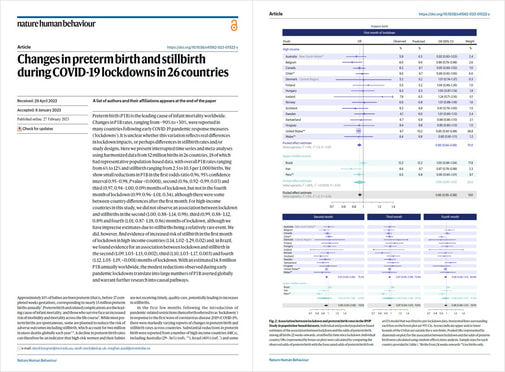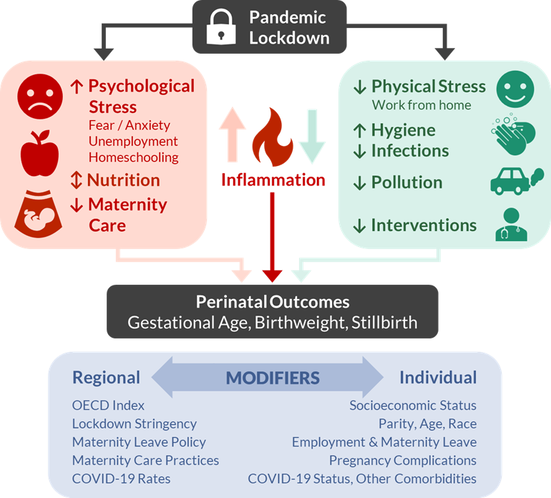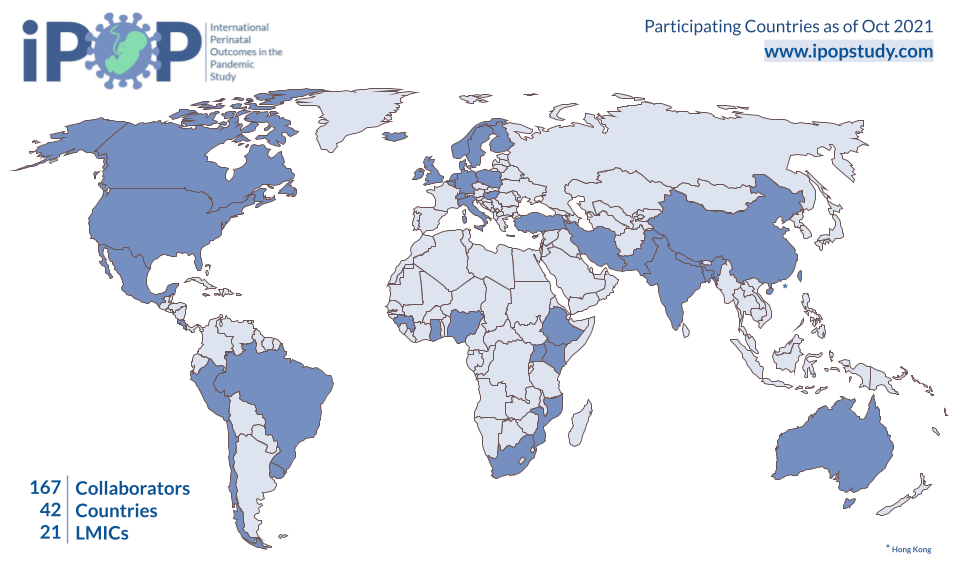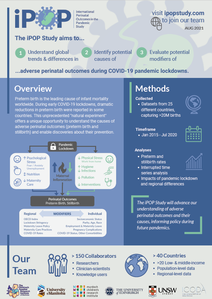Results Published!iPOP Study Results were published in Nature Human Behaviour in February 2023. Read the Open Access paper here!
|
Our StoryDr. Azad, iPOP Study co-Lead, talks about the process of establishing partnerships & assembling an international consortium to study perinatal health during the COVID-19 pandemic. This talk was presented at the May 2021 Pediatric Academic Societies Virtual Conference. See more presentations on our Research Page. |
|
Our Protocol
Click the button below to read The iPOP Study Protocol
Overview
Preterm birth is the leading cause of infant mortality worldwide, but the underlying causes are largely unknown.
During the COVID-19 lockdowns, unprecedented reductions in preterm birth rates (up to 90% in Denmark) and very low birth weight (70% in Ireland) have been reported - although data from Nepal show an opposite trend, and increases in stillbirth. It is critical to evaluate these trends globally using high quality data, and to understand the underlying cause(s). Pandemic lockdowns have dramatically impacted maternal workload, access to healthcare, hygiene practices, and air pollution - all of which could impact perinatal outcomes and might differentially affect women in different regions of the world. We will seize the unique opportunity offered by the global COVID-19 pandemic to answer these urgent questions .
In the global iPOP study, we will investigate the impact of pandemic lockdowns on preterm birth and stillbirth, and assess the underlying causative factors.
We are asking:
Whether the pandemic is worsening or unexpectedly improving newborn health, our research will provide critical new information to shape prenatal care strategies throughout (and well beyond) the pandemic.
During the COVID-19 lockdowns, unprecedented reductions in preterm birth rates (up to 90% in Denmark) and very low birth weight (70% in Ireland) have been reported - although data from Nepal show an opposite trend, and increases in stillbirth. It is critical to evaluate these trends globally using high quality data, and to understand the underlying cause(s). Pandemic lockdowns have dramatically impacted maternal workload, access to healthcare, hygiene practices, and air pollution - all of which could impact perinatal outcomes and might differentially affect women in different regions of the world. We will seize the unique opportunity offered by the global COVID-19 pandemic to answer these urgent questions .
In the global iPOP study, we will investigate the impact of pandemic lockdowns on preterm birth and stillbirth, and assess the underlying causative factors.
We are asking:
- Is this (really) happening everywhere? - We will assess preterm birth and stillbirth rates around the world to determine if changes during the pandemic lockdown are real and consistent globally, or show regional variation.
- What is the reason? - We will determine if regional changes in preterm birth or stillbirth during lockdown are related to regional differences in the stringency or type of lockdown measures, maternity leave policies, maternity care practices, or air pollution.
- Are all pregnancies affected? - We will explore whether these relationships depend on a mother’s age, race, socioeconomic status, healthcare usage, pre-existing health conditions or pregnancy complications.
Whether the pandemic is worsening or unexpectedly improving newborn health, our research will provide critical new information to shape prenatal care strategies throughout (and well beyond) the pandemic.
Our Team
We have assembled a collaborative international team across 41 countries (so far!) - involving over 150 researchers with rapidly accessible perinatal data. Our team includes neonatologists, obstetricians, epidemiologists, public health researchers, and environmental scientists. Together, we will leverage the most disruptive and widespread ‘natural experiment’ of our lifetime to catalyse rapid discoveries about preterm birth, stillbirth and perinatal health. Read more about the iPOP Team.
Resources: Data, Code, Guiding Principles
|
Funding for the iPOP Study Consortium has ended, but data and code are available for future analyses with appropriate permissions.
The iPOP Study is a Team Science-based collaboration. With this in mind, we have developed a set of overall Guiding Principles for the iPOP Study to promote collaboration, transparency, and equity among all Team Members. You can download our iPOP Study One-Pager (pictured right) for sharing with your networks. |






